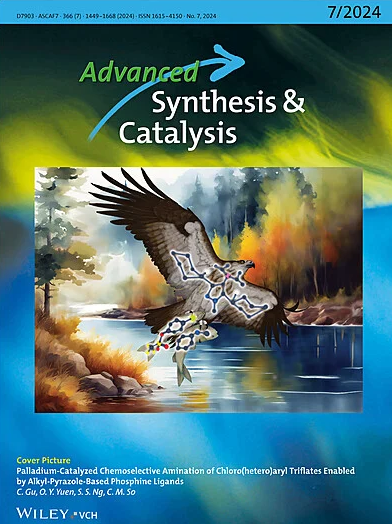High‐Performance and Recyclable Multisite Catalytic System for CO₂ Fixation Using Crown Ether‐Linked Schiff Base and Alkali Halides
IF 4.4
2区 化学
Q2 CHEMISTRY, APPLIED
引用次数: 0
Abstract
The development of efficient and sustainable catalytic systems for CO<sub>2</sub> fixation is crucial for carbon‐neutral chemical processes. We now report a high‐performance and recyclable multisite catalytic system based on a crown ether‐linked Schiff base in combination with alkali halides for the synthesis of cyclic carbonates from epoxides and CO<sub>2</sub>. The designed catalyst features multiple active sites, including a Lewis acidic alkali ion center and a nucleophilic iodide source, enabling the efficient activation of epoxides under solvent‐free conditions with atmospheric pressure. Systematic studies on the effects of cations and calcium salts revealed that the multi‐activation mechanism plays a critical role in enhancing the catalytic performance. The catalyst exhibited a high selectivity and activity, achieving up to a 97 % yield of cyclic carbonates at atmospheric CO<sub>2</sub> pressure and 70 °C. The simulated post‐combustion exhaust gas (CO<sub>2</sub>: 7.5 %, N<sub>2</sub>: 92.5 %, relative humidity: 90 %) was concentrated to 97 % and used as the material for the reaction to yield 90 % of styrene carbonate from styrene oxide. Furthermore, the catalyst was easily recovered and reused for multiple cycles without any significant loss of activity. This study provides a practical and environmentally‐friendly approach for CO<sub>2</sub> utilization, contributing to the advancement of sustainable catalytic processes.利用冠醚连接的希夫碱和碱卤化物催化固定CO₂的高性能可回收多位点催化系统
CO<sub>2</sub>;固定对碳中性化学过程至关重要。我们现在报道了一种基于冠醚连接希夫碱与碱卤化物结合的高性能可回收多位点催化体系,用于从环氧化物和CO<;sub>2</sub>;合成环状碳酸盐。设计的催化剂具有多个活性位点,包括Lewis酸性碱离子中心和亲核碘化物源,能够在无溶剂条件下在常压下有效激活环氧化物。系统地研究了阳离子和钙盐对催化性能的影响,揭示了多活化机制在提高催化性能中起着关键作用。该催化剂表现出高选择性和高活性,在常压CO<;sub>2</sub>;压力和70°C。模拟的燃烧后废气(CO<sub>2</sub>: 7.5%, N<sub>2</sub>: 92.5%,相对湿度:90%)浓缩到97%,作为反应的原料,从苯乙烯氧化物中得到90%的碳酸苯乙烯。此外,催化剂很容易回收并重复使用多次循环,而没有任何明显的活性损失。本研究为CO<;sub>2</sub>;利用,促进可持续催化过程的发展。
本文章由计算机程序翻译,如有差异,请以英文原文为准。
求助全文
约1分钟内获得全文
求助全文
来源期刊

Advanced Synthesis & Catalysis
化学-应用化学
CiteScore
9.40
自引率
7.40%
发文量
447
审稿时长
1.8 months
期刊介绍:
Advanced Synthesis & Catalysis (ASC) is the leading primary journal in organic, organometallic, and applied chemistry.
The high impact of ASC can be attributed to the unique focus of the journal, which publishes exciting new results from academic and industrial labs on efficient, practical, and environmentally friendly organic synthesis. While homogeneous, heterogeneous, organic, and enzyme catalysis are key technologies to achieve green synthesis, significant contributions to the same goal by synthesis design, reaction techniques, flow chemistry, and continuous processing, multiphase catalysis, green solvents, catalyst immobilization, and recycling, separation science, and process development are also featured in ASC. The Aims and Scope can be found in the Notice to Authors or on the first page of the table of contents in every issue.
 求助内容:
求助内容: 应助结果提醒方式:
应助结果提醒方式:


